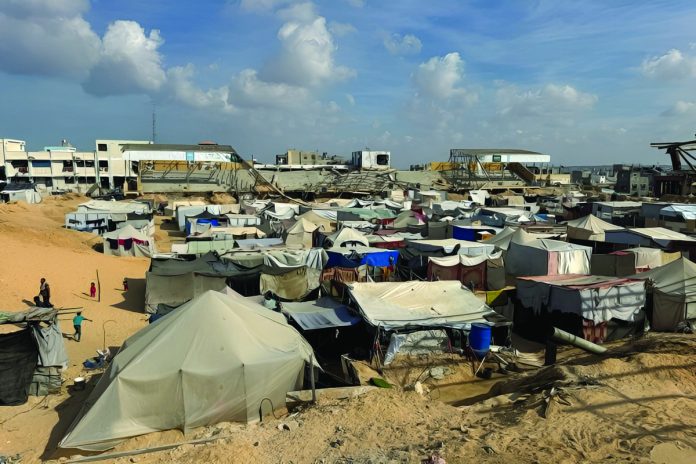The recent high-profile meeting in Riyadh, Saudi Arabia, has sent ripples through global geopolitics, with analysts speculating that it could begin a strategic realignment of world powers. U.S. Secretary of State Marco Rubio and Russian Foreign Minister Sergey Lavrov sat with Saudi Crown Prince Mohammed bin Salman alongside Kremlin advisor Osha Kof.
The meeting’s official agenda revolved around pressing global concerns the Gaza ceasefire, the Palestinian issue, and the ongoing Ukraine-Russia war. However, beneath the surface, the meeting has evoked historical parallels to the 1945 Yalta Conference, where major world powers redrew the map of post-war Europe. Could Riyadh 2025 be laying the groundwork for a new world order?
From February 4 to 11, 1945, the Yalta Conference brought together U.S. President Franklin D. Roosevelt, British Prime Minister Winston Churchill, and Soviet Premier Joseph Stalin. Their discussions shaped the post-World War II order, determining the fate of Europe, the partitioning of Germany, and the establishment of the United Nations. The conference also saw the sidelining of Adolf Hitler, marking Germany’s defeat and subsequent division.
While different in its context, the Riyadh meeting is similar to Yalta in that it involves significant powers making critical decisions about global conflicts this time centered on Gaza, Ukraine, and potentially the Middle East’s future political landscape. The key question remains: Is Riyadh 2025 a venue where the fate of different regions is being decided behind closed doors?
One of the most pressing issues discussed in Riyadh was the ongoing crisis in Gaza. Over two million Palestinians are facing displacement as Israel continues its military operations. The critical discussion points revolved around where these displaced people would go how many could settle in Saudi Arabia, Jordan, or Egypt? How would regional powers handle the inevitable resistance from Palestinian factions and international human rights organizations?
Saudi Arabia has historically been a significant player in the Palestinian issue, balancing its regional ambitions with its role as the custodian of Islam’s holiest sites. However, its increasingly close ties with Israel, brokered through U.S. interests, raise concerns about its position in these negotiations. If Riyadh becomes a key decision-maker in shaping a post-conflict Palestine, what implications will this have for Palestinian self-determination?
Perhaps the most surprising aspect of the Riyadh meeting is the apparent alignment between the U.S. and Russia. For years, these two nations have been at odds over various geopolitical issues, particularly regarding Ukraine and NATO expansion. Yet, their joint presence in Riyadh suggests a possible behind-the-scenes understanding of managing the Middle East’s evolving dynamics, if not a formal alliance.
This raises questions about China’s exclusion from the discussions. China has been a rising global power actively engaging in Middle Eastern affairs, mainly through economic investments and the Belt and Road Initiative. If China is deliberately sidelined, it suggests an effort to carve out a new power structure that limits Beijing’s influence.
China’s absence from the Riyadh meeting has drawn significant attention. The country has been increasingly assertive in global geopolitics, from expanding its influence in Africa and Latin America to positioning itself as a key mediator in Middle Eastern affairs. Unlike the U.S. and Russia, China has maintained a relatively neutral stance on Israel-Palestine while strengthening its economic and strategic ties with Iran and Saudi Arabia.
If the U.S. and Russia are working together to redefine the global order, as some analysts suggest, keeping China out of these discussions is a bold move. But can a new world order be established without involving the world’s second-largest economy and a significant military power? Historically, such attempts have failed, as sidelined powers often respond by forging alternative alliances.
The Riyadh meeting may not be as dramatic as the Yalta Conference, but it signals the beginning of potential shifts in global alignments. The Middle East remains at the heart of global power struggles, and any decisions made there will have far-reaching consequences. Suppose the U.S. and Russia work together to define a new geopolitical landscape. In that case, it remains to be seen how other global players, including China, the European Union, and regional powers like Iran and Turkey, will respond.
The question remains: Are we witnessing the foundation of a new world order? Suppose Riyadh 2025 is indeed the stage where the fate of different regions is being shaped. In that case, the coming years will reveal whether these agreements hold or if we are heading toward another period of geopolitical turbulence. Only time will tell whether this historical moment will be remembered as a turning point or a missed opportunity for authentic global cooperation.







